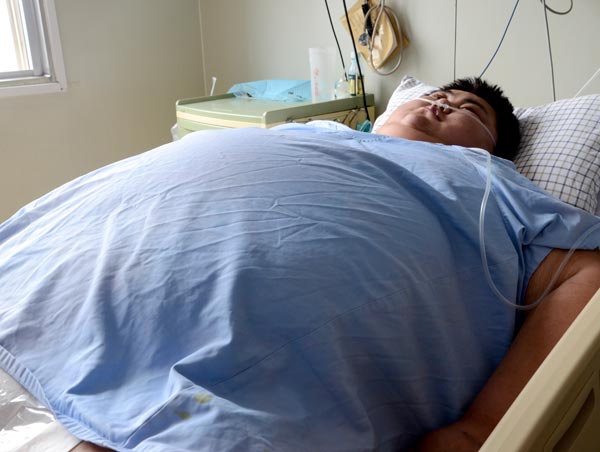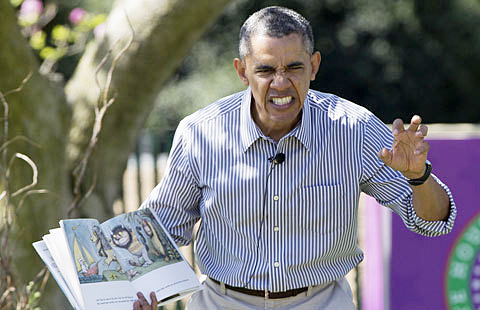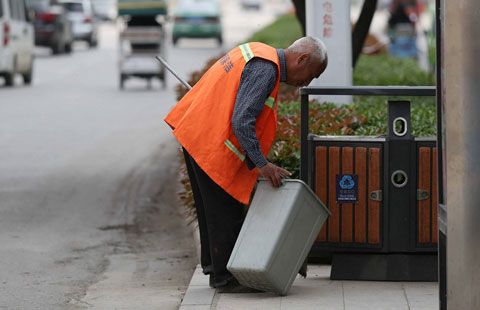Fatal obesity case sets the alarm bells ringing
Updated: 2014-04-23 02:28
By XU WEI in Beijing and WANG QIAN in Jinan (China Daily)
|
||||||||
 |
|
Sun Liang was hospitalized with complications from obesity in Rizhao, Shandong province, on April 14. He died on Sunday.WU RUICHAO / FOR CHINA DAILY |
The death of a 22-year-old man in Rizhao, Shandong province, who weighed nearly 300 kg when he died from lung and heart failure, should serve as a wakeup call to China's growing problems with obesity, according to an expert.
Sun Liang died in the People's Hospital of Rizhao at around 3 pm on Sunday after doctors were unable to revive him when his heart beat suddenly dropped.
He had been receiving treatment at the hospital since early April for ailments caused by obesity. Sun was unable to walk before he was admitted.
Liu Wei, the attending physician, said Sun's weight put immense pressure on his heart and lungs.
"Because of his obesity, the diaphragm put a lot of pressure on his lungs every time he took a breath. As a result, he wasn't getting enough oxygen into his body and he was also having a difficult time exhaling enough carbon dioxide," he said.
Yuan Qun, director of the endocrinology department at the Air Force General Hospital of the People's Liberation Army, said Sun's case exposes the country's problems with obesity.
"Sun Liang is an extreme case of obesity. But it represents a growing trend," he said.
Obesity has become a growing health concern among all age groups in China in recent decades. In 2013, the State General Administration of Sports reported in a survey that 34.4 percent of Chinese between the ages of 20 and 69 were overweight and that 12.7 percent were obese. The survey questioned more than 43,000 people in 10 provinces, autonomous regions and municipalities.
There were 120 million obese people in China under the age of 18 in 2010, according to a report released that year by the Chinese Center for Disease Control and Prevention. A national survey in 2010 found that the obesity rate for people over 18 was 12 percent and that 30 percent of people in the country were overweight.
Liu said the hospital has been unable to determine what caused Sun's obesity and added that the thick layer of body fat has made diagnostic methods, including X-rays and ultrasound, impossible.
Sun's cousin, who declined to give his name, said Sun had been only slightly obese before the age of 16, but quickly gained a lot of weight. Sun's father told Qilu Evening News that his son could eat three times more than he could at each meal.
"He ate a lot of snacks, too," the father said.
Yuan said Sun's obesity could have been due to a combination of factors, including endocrine disorders, overeating and genetics.
"But if Sun's family had caught the problem earlier, his obesity could have been avoided," he said.
The cousin said poverty had prevented Sun's family from getting him the medical treatment he needed at an earlier age. Sun's father supports the family through a 0.2-hectare farm and occasional part-time work.
The cousin said Sun's father had even wavered over sending his son to the hospital for fear of being unable to pay the medical bills.
"I told him I could lend him money. We could not see him suffering like this," he said.
Sun's mother is also overweight and has mental illnesses, Qilu Evening News reported.
Yuan said Sun's case is a reminder that the country should devote more medical efforts to tackling obesity. He said a healthy lifestyle among the country's young people should also be promoted.
"Chinese medical standards on obesity are close to those of Western countries. What is lacking is a healthy lifestyle," he said.
Contact the writers at xuwei@chinadaily.com.cn and wangqian2@chinadaily.com.cn.

 College ping pong lures Chinese students
College ping pong lures Chinese students
 McDonald's will make over mainland stores
McDonald's will make over mainland stores
 Chinese reporters shop till they drop in LA
Chinese reporters shop till they drop in LA
 William and Kate visit Australia's indigenous academy
William and Kate visit Australia's indigenous academy
 Obamas host White House Easter Egg Roll
Obamas host White House Easter Egg Roll
 Photo Story: Dying man seeks caregiver for ailing wife
Photo Story: Dying man seeks caregiver for ailing wife
 Wrongly jailed man lands stable job
Wrongly jailed man lands stable job
 Fire erupts in E China appliance plant
Fire erupts in E China appliance plant
Most Viewed
Editor's Picks

|

|

|

|

|

|
Today's Top News
Obama appoints Chinese American to commission
Obama's trip not to 'contain' China
College ping pong lures Chinese students
Chinese biz schools to lure CEOs
McDonald's to make over in China
Chinese American appointed to commission
Chinese reporters shop till they drop in LA
Tesla to power up across China
US Weekly

|

|







